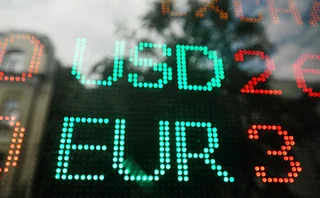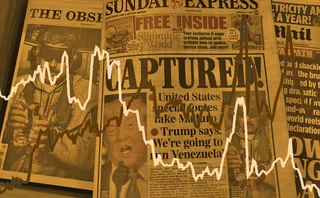
Swaps market mutation could replace managed change
Banks are finding it harder to control the future of the swaps market - that's no bad thing

The man on the other end of the line – founder of a year-old fintech start-up – sighed audibly. He was recounting his experiences in trying to close a round of financing that would have given his firm the capital it needed to expand: its service was tried and tested, bank users were benefiting, but bank investors were proving difficult to work with, on two counts.
First, he said, they were not willing to tie up as much capital as the firm needed – forcing him to expand the size of the prospective investing consortium. Second, keeping a large number of potential investors happy was a lot of work for a small firm operating on a shoestring budget.
In the meantime, the company was trying to buy itself time, and find mentors, by competing for the resources and advice offered by start-up accelerators and incubators.
At times, success seemed to be just beyond his grasp; at others, it felt completely out of reach.
Banks tell the same story from a different perspective: of teeming fintech start-ups, tighter capital constraints, and a splintering of bank strategy that makes it harder for dealers to agree on a common goal.
There is frustration on both sides. The former head of one bank's strategic investing team says bluntly: "Regulators don't want us making principal investments". The fintech founder believes he has hit a Catch-22 for start-ups – the firm needs a consortium to back it; but such a consortium is near-impossible to construct or satisfy.
All of this has big implications for the way innovation happens – or doesn't happen – in the derivatives markets. The past 20 years have seen radical shifts in central clearing, confirmations, electronic trading, market data and messaging, among other areas, but in many cases the companies leading the way were collectively owned by the dealers. When change happened, it did so with the blessing of the industry.
Even some bankers now acknowledge the flaws in this model. Speaking to Risk.net recently, a veteran derivatives trader said ruefully: "We were too slow to change; too closed. There was too much control."
That may be less true in future. The current explosion of ideas and innovation is not something the banks can control via their relatively small – and newly constrained – strategic investing teams. The outcome may be that some good ideas wither away; but it also seems likely to increase the chance that the evolution of markets businesses is no longer stage-managed; there will be surprises, mutations and evolutionary leaps.
Only users who have a paid subscription or are part of a corporate subscription are able to print or copy content.
To access these options, along with all other subscription benefits, please contact info@risk.net or view our subscription options here: http://subscriptions.risk.net/subscribe
You are currently unable to print this content. Please contact info@risk.net to find out more.
You are currently unable to copy this content. Please contact info@risk.net to find out more.
Copyright Infopro Digital Limited. All rights reserved.
As outlined in our terms and conditions, https://www.infopro-digital.com/terms-and-conditions/subscriptions/ (point 2.4), printing is limited to a single copy.
If you would like to purchase additional rights please email info@risk.net
Copyright Infopro Digital Limited. All rights reserved.
You may share this content using our article tools. As outlined in our terms and conditions, https://www.infopro-digital.com/terms-and-conditions/subscriptions/ (clause 2.4), an Authorised User may only make one copy of the materials for their own personal use. You must also comply with the restrictions in clause 2.5.
If you would like to purchase additional rights please email info@risk.net
More on Markets
Brokers must shift HFT servers after China colocation ban
New exchange guidance drives rush for “proximity colo” in nearby data centres
LatAm FX carry trade shrugs off geopolitical fears
Clients in regional carry positions remain undeterred by US interventions, say dealers
S&P bull run drives interest in reset and lookback hedges
Variable strike put options proved popular alternative hedging format of 2025
US mutual funds slash short euro positions at record pace
Counterparty Radar: Pimco cut $4.6bn of EUR/USD puts in Q3 amid changing stance on dollar direction
Nomura hires new global eFX head
Mark McMillan to oversee e-trading and sales activities in newly created role
Trump’s LatAm gambit spurs FX hedging rush
Venezuela op boosts risk reversals as investors look to protect carry trades
One Trading brings 24/7 equity trading to Europe
Start-up exchange will launch perpetual futures Clob in Q1 after AFM nod
FXGO volumes surge despite fee switch-on
Dealers split on whether levy is behind volume increases across SDPs








